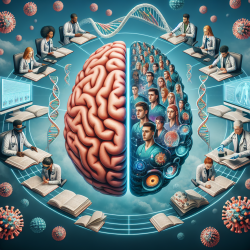Introduction
In the dynamic field of speech-language pathology, particularly when working with children, integrating insights from various scientific disciplines can significantly enhance therapeutic outcomes. The recent research article "Goals in Nutrition Science 2020-2025" provides a comprehensive overview of advancements in nutrition science that can be applied to improve speech-language therapy practices. This blog explores how these findings can be utilized by practitioners to foster better communication skills in children, emphasizing data-driven decisions and evidence-based practices.
The Interplay Between Nutrition and Communication
Nutrition science has made significant strides in understanding how diet impacts overall health, including cognitive and communicative functions. The article highlights the importance of sustainable development goals (SDGs) in nutrition, which align closely with the objectives of speech-language pathology. By focusing on the gut-brain axis and the human microbiome, nutrition science provides valuable insights into how dietary habits influence cognitive development and communication skills in children.
Data-Driven Approaches in Therapy
As practitioners, utilizing data-driven approaches is crucial for creating effective therapy plans. The research underscores the necessity of integrating big data and advanced methodologies to analyze the complex interactions between nutrition and communication. By adopting these approaches, speech-language pathologists can tailor interventions to meet the unique needs of each child, ensuring that therapy is both effective and sustainable.
Implementing Functional Foods in Therapy
Functional foods, which are designed to provide health benefits beyond basic nutrition, can play a pivotal role in supporting speech and language development. The article discusses the potential of these foods to modulate physiological processes and enhance cognitive functions. Practitioners can incorporate functional foods into therapy plans to support brain health and improve communication outcomes in children.
Encouraging Further Research
The research article calls for more human-based studies to strengthen the evidence supporting the use of nutrition in therapeutic settings. Speech-language pathologists are encouraged to collaborate with nutritionists and researchers to explore the impact of dietary interventions on communication skills. This multidisciplinary approach will not only advance the field but also provide robust data to inform future practices.
Conclusion
Integrating nutrition science into speech-language pathology offers a promising avenue for enhancing therapeutic outcomes. By leveraging data-driven decisions and incorporating functional foods, practitioners can create more effective and personalized therapy plans. As we continue to explore the intersection of nutrition and communication, further research will be essential in refining these strategies and ensuring optimal outcomes for children.
To read the original research paper, please follow this link: Goals in Nutrition Science 2020-2025.










